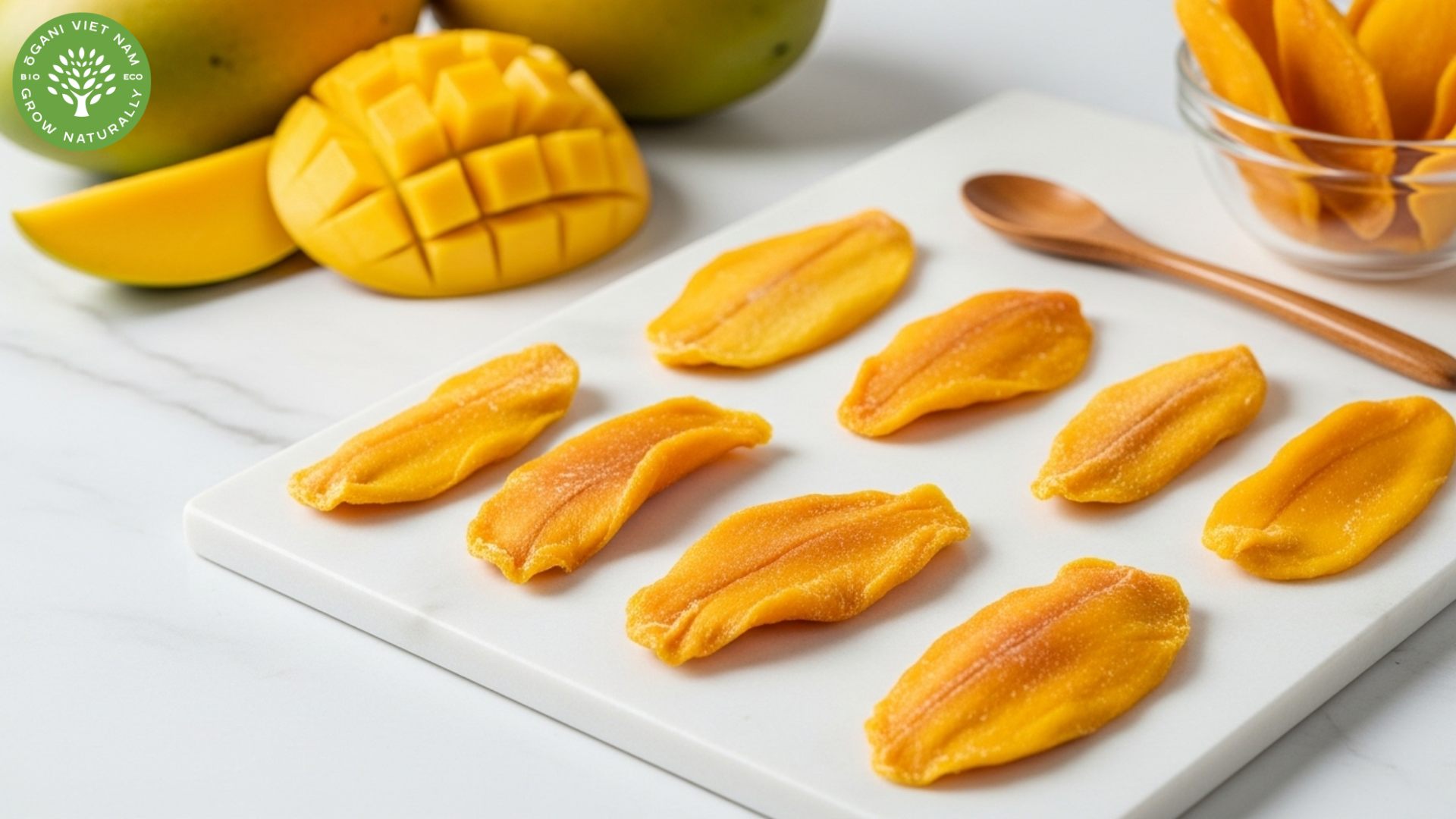
Is dried mango healthy? Yes, when chosen wisely and eaten in moderation, dried mangoes offer valuable nutrients like vitamins and fiber, but they’re also calorie-dense with concentrated natural sugars. At Ogani VN, we believe understanding both the benefits and considerations helps you make informed snacking choices.
Nutritional profile and caloric content
When we examine dried mango’s nutritional footprint, the picture becomes clearer. A typical 40-gram serving contains approximately 128 calories, 1.2 grams of protein, 31 grams of carbohydrates, and 2.4 grams of dietary fiber. The dehydration process concentrates these nutrients into a smaller package, making dried mango more calorie-dense than its fresh counterpart.
The vitamin content remains impressive despite processing. Dried mango retains significant amounts of vitamin A, providing about 56% of your daily needs in a single serving. Vitamin C levels, while reduced from fresh mango, still contribute meaningfully to your antioxidant intake. Additionally, you’ll find folate, potassium, and beta-carotene in concentrated forms.
However, the sugar content deserves attention. That same 40-gram serving contains roughly 26 grams of naturally occurring sugars – no added sweeteners needed. This concentration means the glycemic impact differs significantly from eating fresh mango, affecting blood sugar levels more rapidly.
Health benefits of consuming dried mango
Digestive health support

The fiber content in dried mango promotes healthy digestion by encouraging regular bowel movements and supporting beneficial gut bacteria. This dietary fiber also helps you feel fuller for longer periods, potentially reducing overall calorie intake when portion sizes remain controlled.
Antioxidant powerhouse
Dried mangoes deliver concentrated antioxidants, particularly beta-carotene and vitamin A. These compounds help combat oxidative stress in your body, supporting immune function and potentially reducing inflammation. The antioxidant density actually increases through the drying process, as water removal concentrates these beneficial compounds.
Energy and mood benefits
The natural sugars provide quick energy, while B-complex vitamins support energy metabolism and may help reduce stress levels. Some people report mood improvements after incorporating dried mango into their diet, likely due to the combination of natural sugars and nutrients that support neurotransmitter function.
Potential drawbacks and health considerations
Despite the nutritional benefits, several factors warrant careful consideration. The high calorie density means portions must be controlled – it’s remarkably easy to consume 200-300 calories without realizing it. This caloric concentration can contribute to weight gain if you’re not mindful of serving sizes.
The concentrated sugars can cause blood sugar spikes, particularly concerning for individuals with diabetes or insulin resistance. Unlike fresh mango, which contains more water and fiber to slow sugar absorption, dried versions deliver their sugar payload more rapidly.
Some commercial varieties contain added sugars, sulfites, or preservatives that may trigger sensitivities in certain individuals. These additives can significantly increase the caloric and sugar content beyond what naturally occurs in the fruit.
Digestive issues may occur when consuming large quantities. The concentrated fiber and natural fruit sugars can cause bloating, gas, or loose stools in sensitive individuals, especially when increasing intake suddenly.
How to make dried mango healthy in your diet

Moderation remains the key to incorporating dried mango healthfully into your diet. The standard recommended portion is 40 grams daily – roughly equivalent to one-quarter cup of dried pieces. This amount provides nutritional benefits while keeping calories and sugars at reasonable levels.
Timing your consumption strategically can maximize benefits. Consider eating dried mango as a pre-workout snack for quick energy, or pair it with protein and healthy fats to slow sugar absorption. Combining with nuts or seeds creates a more balanced snack that provides sustained energy.
Reading labels becomes crucial when selecting commercial products. Choose unsweetened varieties without added sugars, sulfites, or artificial preservatives. Organic options often provide cleaner ingredient profiles, though they typically cost more.
Storage affects both safety and nutritional quality. Keep dried mango in airtight containers in cool, dry places to prevent mold growth and maintain nutritional integrity. Properly stored dried mango can maintain quality for 6-12 months.
Frequently Asked Questions

How much dried mango should I eat daily? The recommended portion is 40 grams (about 1/4 cup) per day. This provides nutritional benefits while keeping calories and sugars manageable.
Is dried mango better than fresh mango for weight loss? Fresh mango generally supports weight loss better due to higher water content and lower calorie density. Dried mango can fit into weight loss plans with careful portion control.
Can diabetics eat dried mango? Diabetics should consume dried mango cautiously due to concentrated sugars that can spike blood glucose. Consult your healthcare provider and monitor blood sugar responses.
Does the drying process destroy nutrients? Some vitamin C is lost during drying, but many nutrients become concentrated. Antioxidants like beta-carotene actually increase in density through water removal.
What’s the difference between dried and freeze-dried mango? Freeze-dried mango retains more original texture and slightly more nutrients, but both varieties offer similar nutritional profiles with concentrated sugars and calories.
Making the right choice for your health
Dried mango can absolutely be a healthy addition to your diet when consumed mindfully. The concentrated nutrients, fiber, and antioxidants offer genuine health benefits, but the caloric density and sugar content require portion awareness. At Ogani VN, we recommend choosing unsweetened varieties and treating dried mango as a nutritious treat rather than a unlimited snack.
Ready to explore premium quality dried fruits? Visit our selection of carefully sourced, unsweetened dried mangoes that deliver maximum nutrition without unnecessary additives. Make the smart choice for your health – your taste buds and body will thank you.
Read more:

